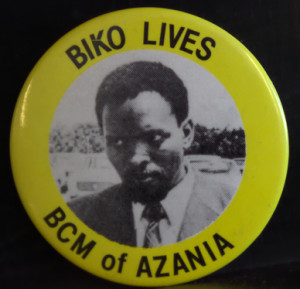The exhibit is a rich digital archive of political buttons from the collection of Jean Augustine, educator, social activist and politician. The collection was curated by Norda Majekodunmi, librarian and subject specialist for human rights and equity.
Jean Augustine, who donated her papers to the Clara Thomas Archives and Special Collections in 2007, is notable for being the first African-Canadian woman elected to Parliament. However, long before becoming a parliamentarian, Augustine was an educator, engaged in community-building and social activism in Toronto. Originally from Grenada, she founded the Grenada Association and the Ontario chapter of the Congress of Black Women of Canada. Augustine, an active member of numerous organizations, including the National Black Coalition of Canada and the Congress of Black Women of Canada, advocated for social change and was concerned with such diverse issues as women’s rights, urban education, violence against women, Black youths and the amelioration of the Black community. Many of the political buttons in the exhibit represent Jean’s activism in these areas from 1960s to the early 2000s.
 The digital archive provides a selection of political buttons representing the themes of multiculturalism, the status of Canadian women, the Black and African-Caribbean community, social activism and political campaign buttons. Jean Augustine, through a recorded interview, provides an oral history of each button to help contextualize event or the significance of the button.
The digital archive provides a selection of political buttons representing the themes of multiculturalism, the status of Canadian women, the Black and African-Caribbean community, social activism and political campaign buttons. Jean Augustine, through a recorded interview, provides an oral history of each button to help contextualize event or the significance of the button.
In the recorded interview, Jean examines an earlier photo of her and a student volunteer in her constituent office in front of her display of political buttons, and remarks how the collection was a “talking piece” for visitors and gradually became dynamic:
“As people saw the button, they remembered that they have a button in the drawer some place at home… so they would bring an extra one and they would pin it on there… I saw a grandmother once pointing at one of the political buttons saying he was our Member of Parliament when I was growing up…and she gave his whole story and history. And so it was a teaching and learning from something as simple as …buttons.”
Some of the stories that Jean tells are touching and poignant. For example, Jean reflects on her participation in the anti-apartheid movement in Toronto during the 1980s, and then the rewarding experience, over a decade later, of visiting South Africa as an election observer for the 1994 democratic election in which Nelson Mandela was elected President. Her activism had come full circle.
Norda Majekodunmi, Associate Librarian and creator of the digital archive, believes that political buttons possess intrinsic cultural value. They not only provide an alternative mode of accessing history, but their tactile nature makes history come alive in more ways than the standard written documentary record can. These metallic mementos, paired with oral history, also provide insights about the life history and identity of the collector, Jean Augustine. Her identity as a Black immigrant woman at the forefront of the struggles for gender and racial equality in Canada is interwoven into the collection. The stories behind the buttons provide a picture of the emerging social activist who would later become a parliamentarian with the portfolios for Multiculturalism and the Status of Women. Interestingly, it was revealed in 1994 that the Toronto police secretly compiled a list of “radical” Black groups, which included the National Black Coalition of Canada, the Albert Johnson Committee Against Police Brutality, Freedom Ride Against Apartheid and the International Committee Against Racism. Jean either participated in all these groups or possessed their buttons.
In 1996, Jean Augustine was instrumental in having Black History Month nationally recognized by the government. Augustine as an educator, social activist and politician, was keenly aware of the importance of acknowledging the stories, experiences, achievements and history of marginalized groups such as African-Canadians. Pushing Buttons, Pushing Stories is a testament to Augustine’s dedication to social change and community activism. The entire Jean Augustine collection is significant as it provides the unique perspective of the Black female experience in Canada, often neglected in memory institutions such as archives. This digital archive provides access to some of these stories and these experiences.
The videos and the images from the archive are digitally preserved and accessible through the York University Digital Library (https://digital.library.yorku.ca/yul-f0515/jean-augustine-fonds ), a digital repository, ensuring that this important collection is discoverable online and accessible to future researchers.


